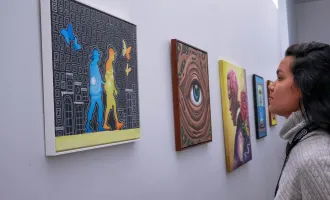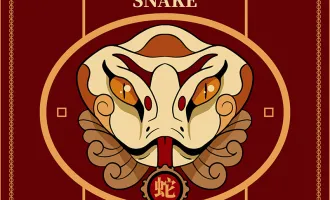‘Music Is Good Medicine’ Adds That Personal Touch
A wide range of uplifting musical performances, from a cappella to guitar and ukulele, highlighted the second annual Music Is Good Medicine Holiday Concert.
The concert, held on December 7 in Cole Hall, provides entertainment during the holiday season, while promoting awareness of Music Is Good Medicine program in the UCSF community and recruiting more talented volunteers.
Music Is Good Medicine brings musically talented volunteers, accompanied by professionally trained chaplains, to perform at the bedside of UCSF Medical Center and UCSF Benioff Children's Hospital patients and their loved ones. Many of the volunteers are staff and former patients. The program has been a part of Spiritual Care Services since 2006.
For one or two hours every week, volunteers visit inpatient rooms at UCSF’s Parnassus campus hospitals, where they perform one or two songs for patients and their families. The program is coordinated by Chaplain Pegi Walker. She notes that classical tunes and spirituals like “Amazing Grace” are usually the most requested, but that the program’s multi-talented volunteers are full of surprises.
Ben Kramarz, a guitarist and vocalist, even plays Metallica riffs, and once fulfilled a request made by a patient in his 20s for a song by Alice in Chains. The young man’s immediate response was an unforgettable. “Man, you just totally made my day!”
Most of the program’s volunteers are from the greater San Francisco community, but some are UCSF faculty, staff and students, who see the program as an opportunity to interact with patients in a different way — to relate with them on a deeper level through music.
The Music Is Good Medicine program is certainly on to something. Physicians worldwide are beginning to incorporate music into treatment plans and to study its impact on patient recovery.
We all know how a soothing melody can help us unwind from a stressful day, but researchers are beginning to further investigate how a patient’s neurological response to music can facilitate healing.
A study out of the University of Munich showed that patients required lower doses of sedative drugs after listening to one hour of Mozart piano sonatas. These patients also demonstrated an easing in both blood pressure and heart rate, and showed a 50 percent increase in their levels of pituitary growth hormone, which is associated with healing.
Furthermore, the Music Is Good Medicine program brings the performers to the bedside, adding a personal touch that can’t be reproduced through the sounds of a speaker. Chaplain Walker says that the volunteers always benefit as much as the patients — the profound patient responses “all feel like a thank you.”
The program is seeking to recruit more volunteers internally from the UCSF campus. If you were not able to attend the concert but are interested in volunteering your musical talents with Music Is Good Medicine, please contact Chaplain Walker by phone at (415) 353-1941, or by email at pegi. walker@ucsfmedctr.org.


